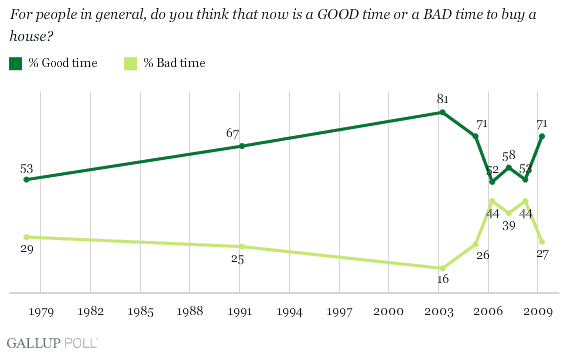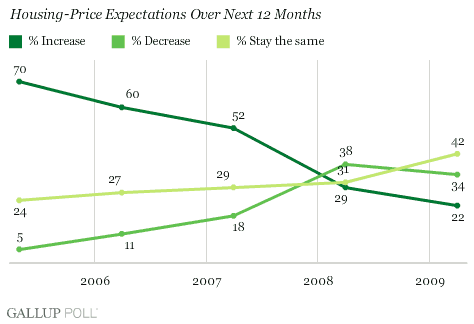PRINCETON, NJ -- Plunging housing prices combined with historically low interest rates have persuaded 71% of Americans that now is a "good time" to buy a house -- up 18 percentage points from a year ago and the highest level of housing-purchase optimism in four years.

Housing Prices: Expectations Slightly More Pessimistic
The S&P/Case-Shiller Home Price Index shows that housing prices in 20 U.S. metropolitan areas were down 19% in January 2009 compared to a year ago. Accordingly, in an April 6-9 survey, ÆéûÜǨû§finds that Americans' outlook for home prices in their areas is slightly more pessimistic than it was a year ago. Fewer Americans now expect housing prices to increase over the next 12 months (22%) than did so in April 2008 (29%), and more expect them to stay the same or decrease (76% vs. 69%).
Consumers' housing-price expectations in 2008 and 2009 stand in sharp contrast to those of the three previous years, when at least half of Americans expected housing prices to increase and fewer than one in five expected them to decrease.

Commentary
The fact that most Americans recognize that now is a good time to buy a house should be good news for home sellers, home builders, realtors, and everyone associated with housing, including the average homeowner. Recognizing that there are many good deals in the housing market is a big part of the "buy" decision, and in most of the post-World War II period, this attitude would lead to a sharp increase in housing sales.
However, the situation is different now for several important reasons. First, housing prices continue to decrease in many areas, and few buyers want to purchase a home and see its value decline immediately. Further, surging unemployment rates and the enormous loss of wealth over the past couple of years has many consumers worried about making major new purchases.
Still, probably the biggest difference has to do with housing credit. Lenders who suffered huge losses by believing housing prices would never decline -- what behavioral economics calls "overconfidence" -- have gone from excessively easy loan underwriting to just the reverse. And even when mortgage loan underwriting standards return to "normal," they will seem a lot more stringent than those of the housing boom years.
At the same time, borrowers have also become more hesitant about their use of mortgage credit. Record home foreclosures have made it clear what can happen when borrowers take on more debt than they can handle. As a result, potential home buyers are less likely to "stretch" to buy a home today that they were during the boom years.
Of course, just getting back to a "normal" housing market will represent a major improvement from the housing depression of recent years. Getting people to recognize that now is a good time to buy is the first step. Getting the mortgage finance system functioning "normally" is the next.
Survey Methods
Results are based on telephone interviews with 1,027 national adults, aged 18 and older, conducted April 6-9, 2009. For results based on the total sample of national adults, one can say with 95% confidence that the maximum margin of sampling error is ôÝ3 percentage points.
Interviews are conducted with respondents on land-line telephones (for respondents with a land-line telephone) and cellular phones (for respondents who are cell-phone only).
In addition to sampling error, question wording and practical difficulties in conducting surveys can introduce error or bias into the findings of public opinion polls.
